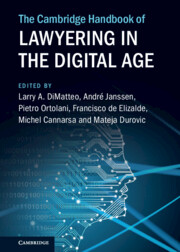Book contents
- The Cambridge Handbook of Lawyering in the Digital Age
- The Cambridge Handbook of Lawyering in the Digital Age
- Copyright page
- Contents
- Detailed Contents
- Figures
- Contributors
- Preface
- 1 Lawyering in the Digital Age
- Part I Effects of Technology on Legal Practice
- 2 Disruptive Effects of Legal Tech
- 3 The Effects of Technology on Legal Practice
- 4 Legal Drafting and Automation
- 5 Emerging Rules on Artificial Intelligence
- Part II Legal Tech and ADR
- Part III Legal Tech in Consumer Relations and Small Claims
- Part IV Legal Tech and Public Law
- Part V Legal Ethics and Societal Values Confront Technology
- Part VI Fate of the Legal Professions
5 - Emerging Rules on Artificial Intelligence
Trojan Horses of Ethics in the Realm of Law?
from Part I - Effects of Technology on Legal Practice
Published online by Cambridge University Press: 18 November 2021
- The Cambridge Handbook of Lawyering in the Digital Age
- The Cambridge Handbook of Lawyering in the Digital Age
- Copyright page
- Contents
- Detailed Contents
- Figures
- Contributors
- Preface
- 1 Lawyering in the Digital Age
- Part I Effects of Technology on Legal Practice
- 2 Disruptive Effects of Legal Tech
- 3 The Effects of Technology on Legal Practice
- 4 Legal Drafting and Automation
- 5 Emerging Rules on Artificial Intelligence
- Part II Legal Tech and ADR
- Part III Legal Tech in Consumer Relations and Small Claims
- Part IV Legal Tech and Public Law
- Part V Legal Ethics and Societal Values Confront Technology
- Part VI Fate of the Legal Professions
Summary
Given that artificial intelligence (AI) and machine learning (ML) count among the key technologies of the digital age, the debate on whether and how to regulate this technology raises some of the most fundamental current questions of lawyering in the digital age.1 In fact, these issues are intensively debated and are particularly controversial. In Germany, for instance, two key institutional players have taken fundamentally different views. On the one hand, the influential ‘Initiative D21’, Germany’s largest non-profit network, dedicated to a digital society and comprising key actors in business, politics, civil society, science and academia, prominently rejects the introduction of any new regulations for algorithms.2 On the other hand, the Data Ethics Commission, a group of sixteen independent experts, created by the Federal Government, ‘holds the view that regulation is necessary, and cannot be replaced by ethical principles’.3 These positions seem to imply that an either-or decision needs to be taken with respect to AI – either ethical principles or legal regulation. At least, both the Initiative D21 and the report of the Data Ethics Commission are based on the understanding of ethical and legal rules as two entirely different categories, two categories that neither overlap nor interfere with one other. This chapter will query that understanding and argue that ethical guidelines and principles may in fact bring about significant legal implications, despite their ethical branding. If this is true, it seems misleading to disguise rules as purely ethical principles, thereby hiding their effective relevance and impact. The relevance of such a potential hardening of soft ethical principles cannot be overstated, given the current emergence of a multitude of such guidelines on AI, at various levels and by different players.
- Type
- Chapter
- Information
- The Cambridge Handbook of Lawyering in the Digital Age , pp. 77 - 96Publisher: Cambridge University PressPrint publication year: 2021
- 2
- Cited by

